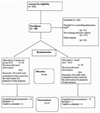Does cognitive behavioral therapy for youth anxiety outperform usual care in community clinics? An initial effectiveness test
- PMID: 20855049
- PMCID: PMC2945382
- DOI: 10.1016/j.jaac.2010.06.009
Does cognitive behavioral therapy for youth anxiety outperform usual care in community clinics? An initial effectiveness test
Abstract
Objective: Most tests of cognitive behavioral therapy (CBT) for youth anxiety disorders have shown beneficial effects, but these have been efficacy trials with recruited youths treated by researcher-employed therapists. One previous (nonrandomized) trial in community clinics found that CBT did not outperform usual care (UC). The present study used a more stringent effectiveness design to test CBT versus UC in youths referred to community clinics, with all treatment provided by therapists employed in the clinics.
Method: A randomized controlled trial methodology was used. Therapists were randomized to training and supervision in the Coping Cat CBT program or UC. Forty-eight youths (56% girls, 8 to 15 years of age, 38% Caucasian, 33% Latino, 15% African-American) diagnosed with DSM-IV anxiety disorders were randomized to CBT or UC.
Results: At the end of treatment more than half the youths no longer met criteria for their primary anxiety disorder, but the groups did not differ significantly on symptom (e.g., parent report, eta-square = 0.0001; child report, eta-square = 0.09; both differences favoring UC) or diagnostic (CBT, 66.7% without primary diagnosis; UC, 73.7%; odds ratio 0.71) outcomes. No differences were found with regard to outcomes of comorbid conditions, treatment duration, or costs. However, youths receiving CBT used fewer additional services than UC youths (χ(2)(1) = 8.82, p = .006).
Conclusions: CBT did not produce better clinical outcomes than usual community clinic care. This initial test involved a relatively modest sample size; more research is needed to clarify whether there are conditions under which CBT can produce better clinical outcomes than usual clinical care. CLINICAL TRIAL REGISTRY INFORMATION: Community Clinic Test of Youth Anxiety and Depression Study, URL: http://clinicaltrials.gov, unique identifier: NCT01005836.
Copyright © 2010 American Academy of Child and Adolescent Psychiatry. Published by Elsevier Inc. All rights reserved.
Conflict of interest statement
Disclosure: Dr. Southam-Gerow and Dr. McLeod receive financial support from the National Institute of Mental Health. Dr. Weisz receives financial support from the National Institute of Mental Health, the Norlien Foundation, and the John D. and Catherine T. MacArthur Foundation. Dr. Chu, Gordis, and Connor-Smith report no biomedical financial interests or potential conflicts of interest.
References
-
- Schoenwald SK, Hoagwood K. Effectiveness, transportability, and dissemination of interventions: What matters when? Psychiatric Services. 2001;52:1190. - PubMed
-
- Weisz JR. Psychotherapy for Children and Adolescents: Evidence-Based Treatments and Case Examples. Cambridge University Press; 2004.
-
- Silverman WK, Pina AA, Viswesvaran C. Evidence-based psychosocial treatments for phobic and anxiety disorders in children and adolescents. Journal of Clinical Child and Adolescent Psychology. 2008;37:105–130. - PubMed
-
- Kendall PC, Hudson JL, Gosch E, Flannery-Schroeder E, Suveg C. Cognitive-behavioral therapy for anxiety disordered youth: A randomized clinical trial evaluating child and family modalities. Journal of Consulting and Clinical Psychology. 2008;76:282–297. - PubMed


